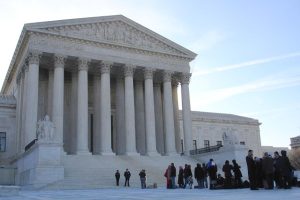 WASHINGTON, D.C. – In a brief filed Friday, Texas Attorney General Ken Paxton described HB 1181, the state’s age verification law being challenged by the Free Speech Coalition and other plaintiffs, as a “modest but important law” that “satisfies any level of scrutiny.”
WASHINGTON, D.C. – In a brief filed Friday, Texas Attorney General Ken Paxton described HB 1181, the state’s age verification law being challenged by the Free Speech Coalition and other plaintiffs, as a “modest but important law” that “satisfies any level of scrutiny.”
Much of the brief’s opening is dedicated to depicting the content of adult websites as extreme and obscene and to making the state’s case HB 1181 is needed to prevent minors from being exposed to harmful material.
“Through smartphones and other devices, children today have instantaneous access to unlimited amounts of hardcore pornography,” Paxton’s brief asserts, “including graphic depictions of rape, strangulation, bestiality, and necrophilia.
“Like ‘doomscrolling’ on social media, online pornographers use sophisticated algorithms to keep adults who have greater maturity than children on their sites,” Paxton adds, misconstruing what ‘doomscrolling’ means, as the term refers to something users do of their own volition, as opposed to something foisted upon users by an algorithm. “Childhood access to this avalanche of misogynistic and often violent smut ‘is creating a public health crisis.’”
The brief also notes that “HB 1181 does not prevent adults from viewing pornography.”
“Instead, it requires online pornographers to take commercially reasonable steps to ensure that their customers are not children,” the brief adds. “Nor is HB 1181 an outlier. Countries all around the world require online pornographers to use age-verification technology.”
As with the briefs submitted by the state in earlier phases of the case, the brief submitted to the Supreme Court on Friday is heavy on rhetoric, some of which seems intended to demonize the plaintiffs and the content of their websites. It leans heavily into describing the most extreme examples of content on the plaintiffs’ sites, avoiding mention of the fact the law’s scope covers a far broader range of content than described by Paxton.
“Petitioners say little about what they sell,” Paxton writes. “But even they admit that Texas has a compelling interest in preventing children from viewing the content on their websites. This Court has held – ‘categorically’ – that ‘obscene material is unprotected by the First Amendment’…and has emphasized that States may prevent ‘the sale to minors of sexual material that would be obscene from the perspective of a child … so long as the legislature’s judgment that the proscribed materials [are] harmful to children ‘[is] not irrational.’”
The brief also seeks to assure the court that HB 1181 is not overly burdensome on operators of adult websites.
“To comply with HB 1181, a covered website need not change anything it posts,” Paxton writes. “Instead, it must require customers to (1) ‘provide digital identification’ or (2) ‘comply with a commercial age verification system that verifies age using’ a ‘government-issued identification’ or ‘commercially reasonable method that relies on public or private transactional data to verify the age of an individual.’ Covered websites thus may use third-party providers like Yoti. And to ensure user privacy, the age-verifier ‘may not retain any identifying information of the individual.’ And, of course, if a covered website is concerned that an age-verification provider may wrongly transmit information to others, it can choose a different provider or do age verification itself.”
Paxton asserts the District Court erred in enjoining the law, while the Fifth Circuit Court of Appeals got it right in reversing the lower court’s holding.
“Because HB 1181 imposes a gatekeeping function that forecloses only minors from accessing obscenity, the Fifth Circuit properly applied Ginsberg’s rational basis analysis,” Paxton asserts. Petitioners do not question that Ginsberg states the proper test for minors’ access to such content, only whether Ginsberg applies when the question is whether prohibiting access by minors allegedly impedes access by adults. Petitioners are wrong: Requiring commercial enterprises to take commercially reasonable steps to verify that their customers are adults need only be a rational way to combat the harms that even Petitioners accept their products cause children.”
The Supreme Court is scheduled to hear oral arguments in the case on January 15, 2025.
You can read Paxton’s full brief here.
Supreme Court image by David Lat












